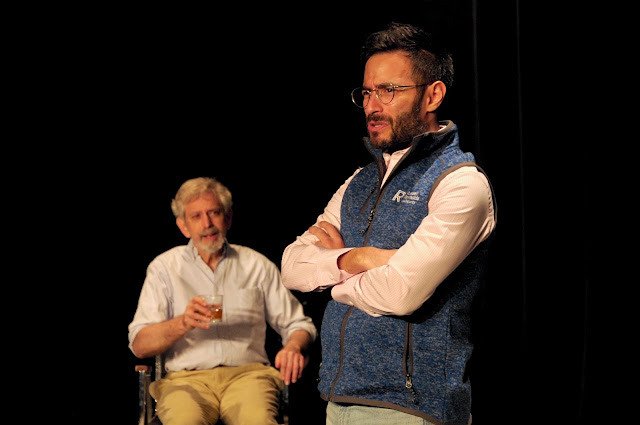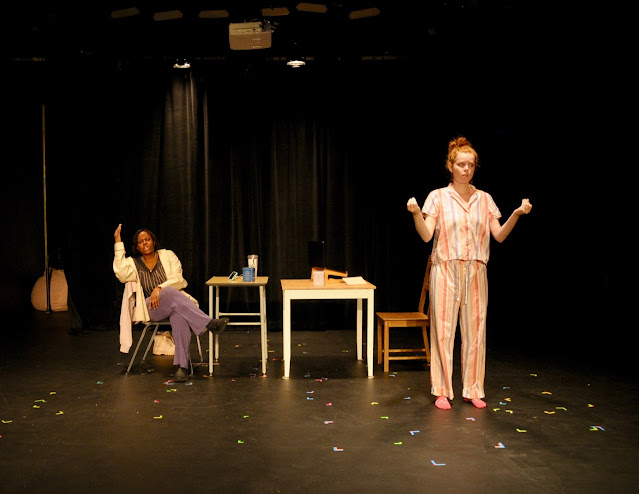Blurring Boundaries 2022: Program B
Plays: Iphis and Ianthe at the Courthouse, written by Aly Kantor and directed by Jonathan Wong Frye; Sons and Fathers, written by Mark Hofmaier and directed by Susanna Frazer; Prometheus Found, written by Michael Narkunski and directed by Perryn Pomatto; Building Blocks, written by Arielle Beth Klein and directed by Jennifer Downes; Shakespeare Recalibrated, written by Amanda Hanna and directed by Sydney Burtner; Ava Hearts Riley, written by Cris Eli Blak and directed by Syona Varty; and Redhead Only Orgy, written by Ruthie Rado and directed by Todd Butera
15 W. 28th St., Manhattan, NYC
August 10-21, 2022
 |
| Bryan Patrick Stoyle and Ruthie Rado in Iphis and Ianthe at the Courthouse. Photo credit: Ruthie Rado |
The plays included in the 2022 incarnation of New Ambassadors Theatre Company's Blurring Boundaries festival, which is dedicated to amplifying marginalized voices, apply the theme suggested in the festival's title to generations, historical periods, gender and sex(uality), and more–even to authorship. The seven short plays (around ten minutes each) discussed here belong to Program B in the festival, and Program A, running in rep, offers a further seven works (seeing one program gets you a discount code, printed on the postcard you receive when you check in at the box office, to see the other). Taken as a group, the plays of Program B provide a perspicacious, inventive, often funny, and generally uplifting concatenation of theatrical voices and viewpoints.
Program B begins with
Iphis and Ianthe at the Courthouse, by Aly Kantor, which finds the lovers in the midst of carrying out an important life decision. Initially, the focus falls on Ianthe's (Ruthie Rado) reminiscences of the pair's childhood and the patriarchal limitations to which she was expected to adhere (girls don't get dirty, girls save themselves for marriage, etc.). But Iphis (Bryan Patrick Stoyle) too has something to share about his past that raises important questions for the couple and leads to a touching reimagining of the normativizing conclusion of the Ovidian tale to which the play's title alludes. Family plays an important role in Mark Hofmaier's
Sons and Fathers as well. The title of
Sons and Fathers evokes Turgenev's novel
Fathers and Sons (1862; sometimes translated as
Fathers and Children), which similarly deals with intergenerational gaps in social ethics and worldviews. In Hofmaier's play, the son and father actually share the same sociopolitical philosophy–or they did. Jeremy's (Paul Pakler) father, Dan (Michael Gnat), has announced that he has seen the error of his previous ways, prompting Jeremy to attempt both to debate his father's newly adopted outlook and to determine what the catalyst was for this unexpected change. Pakler and Gnat lend a very natural rhythm to the push and pull between Jeremy and Dan, and their conversation makes a well observed point about the role of individual emotional experience in beliefs that we often assume are grounded in an ethical logic (one nicely played moment of hesitation on Dan's part also highlights that his new boundaries may not be as impermeable as he projects them to be).
 |
| Michael Gnat and Paul Pakler in Sons and Fathers. Photo credit: Ruthie Rado |
The more important dynamic in
Prometheus Found, by Michael Narkunski, is not between Jacob (Daniel A. Hidalgo) and his mother (Julia Botero)—whose primary role is to serve as a (very funny) example of the imposed labeling from which Jacob wishes to escape—but between Jacob and Prometheus (yes, that one). On a tour of Greece with his sun-visored mom, Jacob encounters the disobedient Titan (Todd Butera, in a hilarious, standout performance in an outstanding play), who carries both a drink and a bit of a chip on his shoulder for not being quite as celebrated as he feels that he should be. The Greek myth of humans' origin as double creatures and the relationship between naming things and according them dignity smartly contribute to the play's themes and unlikely source of Jacob's push towards self-assertion. Self-definition is at the center of Arielle Beth Klein's
Building Blocks as well, which uses the blocks with which a girl named Kayla (Betsy Regus) is playing when the play begins as a symbol for life, self, and growth. Young Kayla, who is at the age when she still believes in cooties, learns some important things from an older Kayla (Florence Friebe) about how many options she really has, an encounter that Regus and Friebe render as sweetly empowering.
 |
Daniel A. Hidalgo and Todd Butera in Prometheus Found. Photo credit: Ruthie Rado |
Shakespeare Recalibrated, by Amanda Hanna, is concerned, rather less happily, with the willing relinquishment of women's hard-won (if always precarious and incomplete) power over their own bodies. Rachael (Julia Botero, in a performance that could not be more different from her turn as Jacob's mom in
Prometheus Found) catches her daughter, Hannah (Arielle Flax), sneaking out to a forced-birth rally, sparking a heated exchange between mother and daughter that includes the revelation of some family history. The characters' dialogue is composed almost entirely using language from the works of Shakespeare, which has the effect of framing the debate in a way that is simultaneously familiar and defamiliarizing. (The appropriation of a canonical male playwright's words by a woman playwright to address women's rights and health adds another layer to this framing.) Cris Eli Blak's
Ava Hearts Riley does not repurpose material from Shakespearean England or classical Greece, but the issues it raises would ideally belong firmly to the past. High school-aged Riley (Ruthie Rado, in a second well realized performance) has been caught by her parents with her girlfriend, Ava (Kendra Augustin). For Riley's family, the problematic aspect of this discovery is not that the relationship is queer but that it is interracial, which in turn means that the relationship is facing a reckoning (this reckoning occurs over a video call, but the staging savvily dispenses with strict realism in this respect).
 |
| Kendra Augustin and Ruthie Rado in Ava Hearts Riley. Photo credit: Ruthie Rado |
Not that
Ava Hearts Riley doesn't have at least one laugh-out-loud moment, but sex-positive comedy
Redhead Only Orgy, by Ruthie Rado, ends the program on a much lighter note (while still prodding at some of those boundaries). Roommates Kelly (Juliana Forrest) and Ted (Daniel A. Hidalgo) have sent out a group invite to a Saturday-night orgy, with a theme, as one might surmise from the title, of redheads only. The redhead theme extends to everything from the snacks to the lube. So why hasn't all of Kelly's planning yet resulted in an apartment full of unclothed gingers? How can Ted and Kelly change that? And what if they can't? With the climax to
Redhead Only Orgy, Program B ends on a high note.
 |
| Juliana Forrest and Daniel A. Hidalgo in Redhead Only Orgy. Photo credit: Ruthie Rado |
Individually distinctive and entertaining, the short plays of Blurring Boundaries 2022's Program B also generate interesting resonances through their juxtaposition (and remember, if you enjoy these, there are seven more plays to see with Program A).
-John R. Ziegler and Leah Richards








Comments
Post a Comment